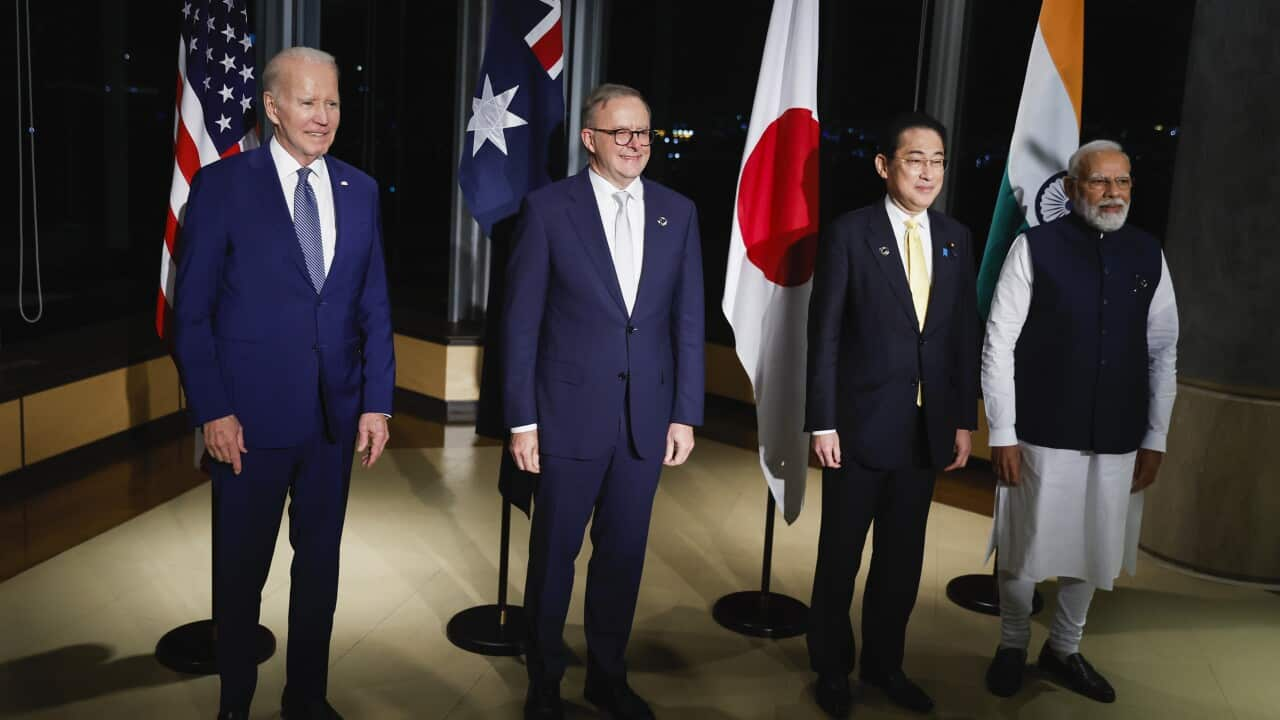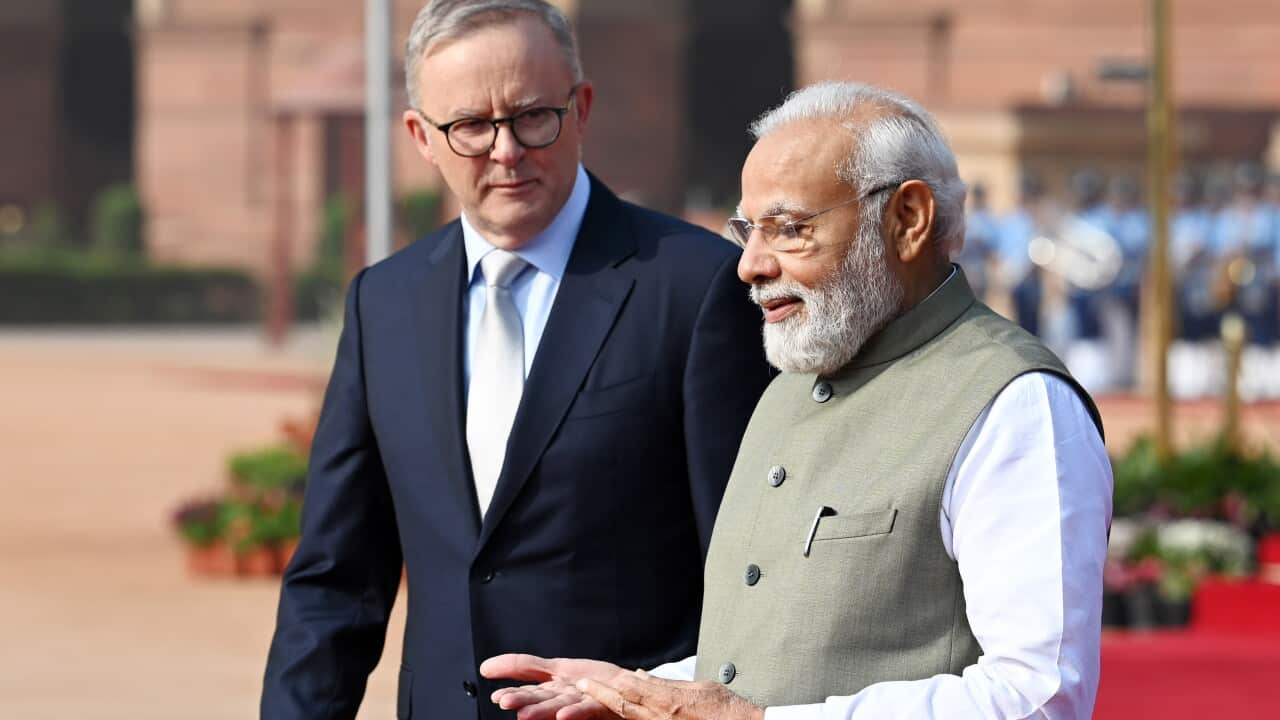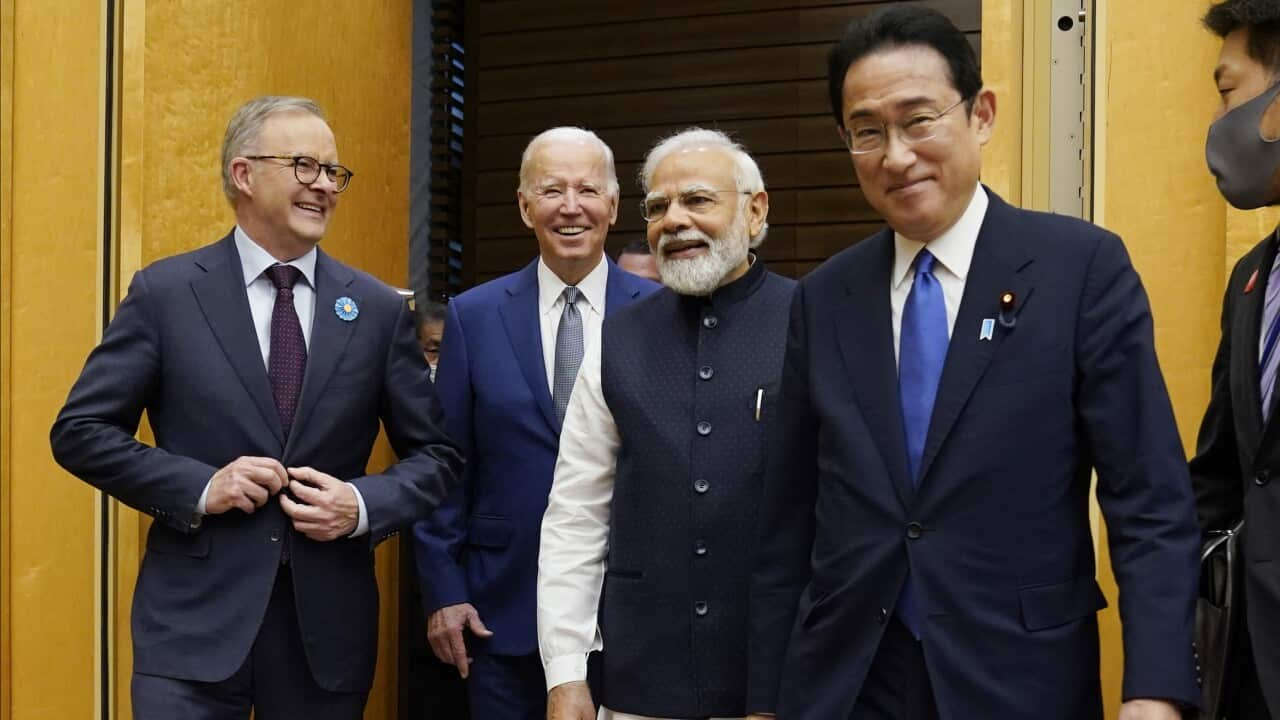Key Points
- The G7 nations expressed "serious concerns" about China's militarisation of the East and South China seas.
- Mr Albanese said he supports the statement.
- The Quad leaders met on the sidelines of the G7 summit to talk clean energy, defence and trade.
Prime Minister Anthony Albanese has expressed his support behind a G7 statement calling out Chinese economic coercion just days after Beijing unwound trade restrictions for Australian timber.
The prime minister said he had been consistent in saying China's activity had provided cause for concern.
"What we need to do is to make sure that we work in a way that enhances peace, security and stability in the region," he told reporters in Japan on the sidelines of the G7 summit on Sunday.
The G7 nations released a statement expressing "serious concerns" about China's militarisation of the East and South China seas and called for a peaceful resolution over Beijing's claims of reunifying Taiwan.
The statement said the nations "oppose China's militarisation activities in the region", accusing Beijing of undermining the international order.
Mr Albanese said he supported the communique.
"On the China language, we have said for some time that China's activity ... has provided concern," he said.
"We expressed our concern in the past and we will continue to do so.
"We very clearly support the status quo when it comes to the Taiwan Strait and that is Australia's position and we are consistently stating that."
Quad leaders meet at G7
Prime Minister Anthony Albanese chaired the Quad leaders' dialogue meeting - which included the leaders of the United States, India and Japan - at the sidelines of the G7 summit in Hiroshima.
Mr Albanese said the Quad would work towards accelerating and expanding clean energy supply chains and boost the workforce in the critical mineral sector.
Alongside US President Joe Biden, Mr Albanese signed a critical mineral and clean energy pact that would put climate and clean energy as a central pillar of the bilateral alliance.
Mr Biden will also lobby Congress to carve out Australia in domestic legislation that would allow the transfer of some otherwise barred defence and technology exports, as well as expand the potential for businesses to co-operate over clean energy technology.
"The president will support the Congress taking action to treat Australian suppliers and activity as domestic activity in the United States for the purpose of the Defence Production Act," Mr Albanese told reporters in Hiroshima on Sunday.
"Canada has that at the moment and if we think about industries like hydrogen, without that support, there would be a massive incentive for hydrogen-based industries to be based in the United States."
The prime minister said there was a risk investment and businesses would leave Australia to set up shop in the US due to incentives being offered under the Inflation Reduction Act, which is leveraging hundreds of billions of dollars worth of clean energy subsidies.
"This is about addressing that," he said.
The Quad partners will also stump up support for the clean energy transition, including through a combined effort to boost renewables and energy security in the Indo-Pacific.
The four leaders agreed they would "act together as a force for good to find common solutions for region-wide benefit", in a joint vision statement released after the leaders' meeting on Saturday.
Mr Albanese said the Quad was "an action-based forum".
He said the Quad partners stood for "an open, stable, secure and prosperous Indo-Pacific region - a region where sovereignty is respected, and all countries large and small benefit from a regional balance that keeps the peace".
"Respect for the leadership of regional institutions including ASEAN, the Pacific Island Forum and the Indian Ocean Rim Association is central to our approach," he said.
Saturday's vision statement of the Quad - whose leaders first met in a virtual format in March 2021 and held face-to-face talks in the US in September 2021 - said the group would build on past examples of co-operation.
"Recently, in our response to the devastation caused by the COVID-19 pandemic, we joined together to expand safe, affordable and effective vaccine production and equitable access," it said.
"The Indo-Pacific's key challenges of health security, rapidly changing technology, the grave threat of climate change and the strategic challenges facing the region, summon us to act with renewed purpose."
The Quad members originally had been scheduled to meet in Sydney next week but rescheduled for the sidelines of the G7 to allow Mr Biden to return to Washington DC on Sunday in hopes of finalising a deal to increase the debt ceiling before the US runs out of cash to pay its bills.
Mr Biden apologised to Mr Albanese in Hiroshima for not meeting him in Sydney.
"I deeply appreciate the flexibility of meeting me here at the G7 meeting," he told Mr Albanese.
Mr Albanese is due to return to Australia on Sunday.













